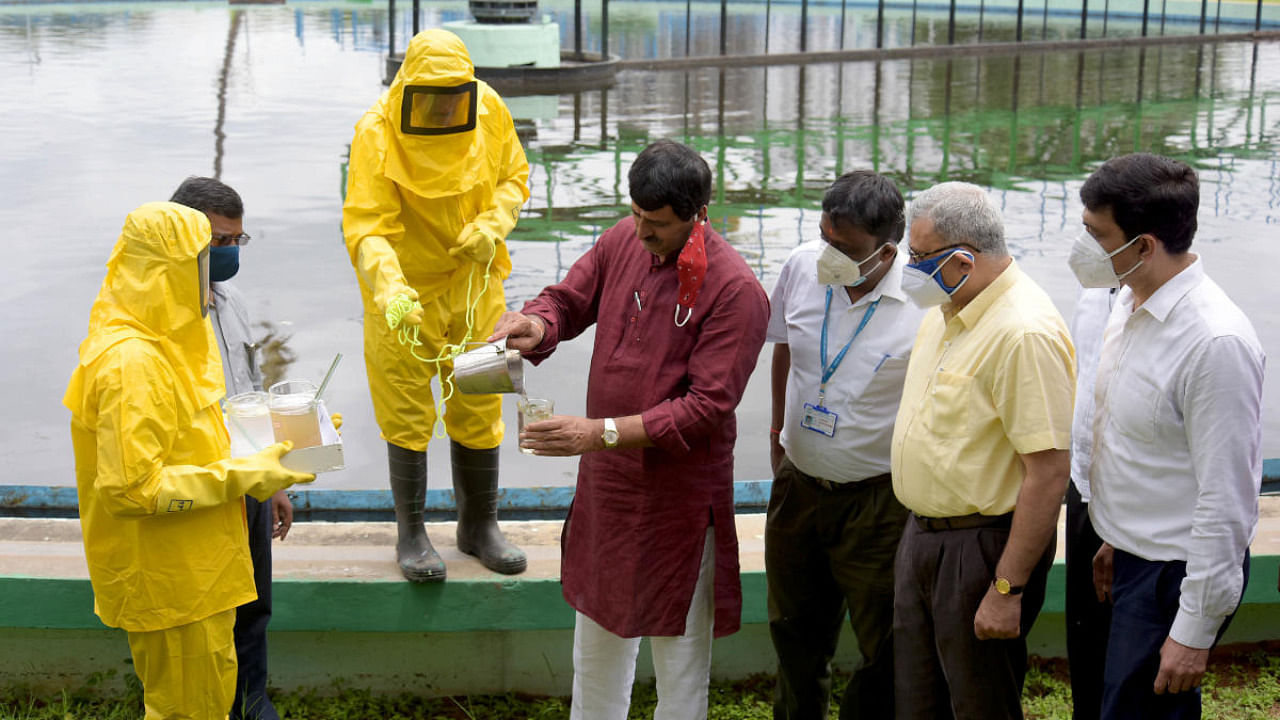
In its efforts to reclaim Vrishabhavathi—once a river and now a polluted stream, the Environment and Ecology department is mulling to upgrade the existing sewage treatment plants (STPs) in the Vrishabhavathi valley to carry out Tertiary Treatment Process (TTP). The upgradation would allow treatment of the sewage for use in agriculture and other secondary and tertiary purposes. The department will chalk out a plan, spread over three to five years, at a cost of Rs 1,500 crore.
With courts and NGT rapping the state government over the quality of water in V Valley and missing out on the deadline of December 2020 for commissioning of STPs in the valley, CP Yogeeshwara, Minister for Environment and Ecology on Thursday inspected the V valley from Gali Anjaneya temple to Byramangala Lake in Ramanagar and directed the officials to complete the project in three months.
“I agree that most of the STPs in the V Valley are not functioning effectively. The two STPs at Nayandahalli, with a capacity of 180 and 150 MLD would require another three months for commissioning. Thereafter there is no chance of sewage flowing into the river. Currently, we have been treating sewage using secondary treatment techniques and the treated water is not properly used. Hence we have decided to upgrade the treatment technique to TTP level and make use of the treated water for agriculture and filling up of lakes along the valley. Tertiary Treatment of one MLD of sewage would cost one crore and may require 1,500 crores for the entire valley. This can be achieved in a phased manner,” Yogeeshwara said.
Acknowledging that the Covid pandemic has slowed the pace of work on STPs, the minister assured that they will be commissioned in the next three months. “If we want to reuse the water and clean the Vrishabhavathi stretch clean, there is no alternative than to tertiary treat the sewage.” he clarified.
As the Karnataka High Court has ordered a survey of the Vrishabhavathi valley, Yogeeshwara said that next week the department will convene a meeting of all the stakeholders including Revenue, Urban Development, BWSSB and others to chalk out plans for reclaiming the most polluted stream of Bengaluru.
We will not support Byramangala diversion project
Close on the heels of the High Court of Karnataka ordering a stay over the Byramangala diversion project as it allegedly involves diverting the flow of the Vrishabhavathi River, Minister Yogeeshwara said that the Environment and Ecology department will not support this diversion project. “The lake is fed by Vrishabhavathi and we are doing everything to clean the stream. It is only for the dredging and de-weeding of the lake bed that the water was diverted. But henceforth we will take suggestions from NEERI and work accordingly without damaging the course of Vrishabhavathi. Once the STPs in upstream is commissioned, there is no question of sewage entering the lake and it will be fresh water.,” the minister explained.
Govt to bypass BU syndicate to set up STP at Jnanabharati
The state government will set up a tertiary STP on the Jnanabharati campus of Bangalore University through special order, according to Environment and Ecology minister CP Yogeeshwara. Previously, the BU syndicate had rejected the BWSSB's demand to part with 10 to 12 acres of land for setting up STP. "The syndicate then had reportedly sighted foul smell as the reason. But with the latest technology, STPs would be as clean as any other place and better than the present stench. We will issue an order as it is in the interest of the people of Bengaluru for setting up an STP," Yogeeshwara replied.
Check out DH latest videos:
